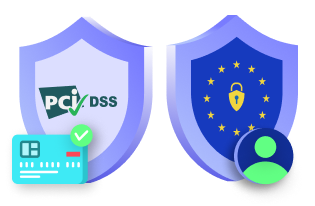The General Data Protection Regulation’s (GDPR) effect on companies worldwide is huge. Companies are striving to meet compliance standards, but it’s easier said than done. The regulation affects not only EU-based companies but also those processing EU individuals’ data, regardless of location. With hefty fines of up to €20 million or 4% of your annual revenue on the line, it’s crucial to stay on top of the key things that must be monitored. But what exactly are those key things? Don’t risk being non-compliant, read on to discover the 4 essential elements that must be watched to monitor and ensure GDPR compliance of your business.
What are the key provisions of GDPR?
Key provisions in GDPR that a business must be aware of to ensure proper consent from individuals:
- Transparency: Companies must be transparent about how they collect, process, and store personal data. This includes providing clear and concise information about what data is being collected, for what purpose, and how long it will be kept.
- Purpose limitation: The collection of personal data must be limited to what is necessary for the specific purpose for which it was collected. This means that companies cannot collect more data than is necessary and cannot use it for purposes other than what was originally agreed upon.
- Data minimization: Companies must minimize the amount of personal data they collect and keep only what is necessary for the specific purpose. This helps to reduce the risk of data breaches and protects individuals’ privacy.
- Individual rights: Under GDPR, individuals have several rights regarding their personal data, including the right to access, correct, and erase their data. Companies must be able to respond to requests from individuals regarding their personal data and must take appropriate steps to protect their rights.
- Consent: Companies must obtain proper consent from individuals for the collection, processing, and storage of their personal data. They must ensure that consent is freely given, specific, informed, and unambiguous. This includes obtaining affirmative action (e.g. ticking a box or clicking a button) from individuals and ensuring that they understand what they are consenting to.
- Data Security: Companies must implement appropriate technical and organizational measures to ensure the security of personal data and to prevent unauthorized access, alteration, or loss of data.
- Record Keeping: Companies must keep records of their data processing activities and make these records available to the relevant authorities upon request.
- Data Protection Officer (DPO): Larger companies or those that process large amounts of sensitive personal data are required to appoint a DPO.
Who is responsible for GDPR compliance in a company?
There are several groups responsible for ensuring GDPR compliance at your company. Firstly, there are the Data Protection Officers (DPOs). This role has become increasingly important since the implementation of GDPR. The DPO is the expert in the company who thoroughly understands the regulations.
Their responsibility is to ensure that all employees are aware of GDPR compliance, regulations are being followed, and any risks or problems are promptly addressed. The DPO must also be transparent in communicating with relevant authorities, customers, and stakeholders in case of any issues. Additionally, they are responsible for ensuring that the company is in compliance with other privacy laws such as the California Consumer Privacy Act (CCPA).
What are the responsibilities of a DPO?
- Personal data processing: DPOs should keep an eye on how personal data is collected, stored, used, and transferred to ensure it aligns with GDPR guidelines.
- Data subject rights: DPOs should oversee the execution of data subject rights such as the access, rectification, and erasure of personal data.
- Data Protection Impact Assessments: DPOs should make sure that high-risk data processing activities undergo a DPIA and that any findings are promptly addressed.
- Privacy policies and procedures: DPOs should regularly monitor and update the company’s privacy policies and procedures to remain GDPR compliant.
- Data breaches: DPOs should have a system in place to detect, report, and respond to data breaches, including notifying relevant authorities and affected individuals.
- Third-party data processors: DPOs should ensure contracts with third-party data processors comply with GDPR and keep track of their activities.
- Training and Awareness: DPOs should provide all employees with appropriate training on GDPR compliance and keep their knowledge up-to-date.
- International data transfers: DPOs should monitor transfers of personal data outside the EU and ensure they comply with GDPR regulations.
- Records of processing: DPOs should keep records of all personal data processing activities and review them regularly.
4 things to monitor to ensure GDPR compliance
#1 Changes to subprocessors of personal data or GDPR addendums
A subprocessor is a third party that processes personal data on behalf of a data controller. For instance, if you run a SaaS company, you may outsource customer support or payment information to another third-party firm. If you use any of these SaaS tools, it is likely that your contract with these parties already has provisions for subprocessing of data and data protection provisions.
However, it is important to confirm that these provisions comply with GDPR. If your vendors have GDPR addendums or subprocessor lists, you should monitor these documents to ensure that the data you entrust to these SaaS apps are being processed properly and by trustworthy third parties.
#2 Review the website for GDPR compliance
One way to monitor compliance with GDPR is to review your company’s web pages and ensure they meet GDPR requirements. This involves having a straightforward Privacy Policy and Terms of Service. GDPR mandates that you provide a means for individuals to reach out to you regarding any questions or concerns, commonly referred to as a Data Subject Request process.
#3 Monitor news of enforcement
It is crucial to ensure your organization is compliant with the GDPR by monitoring enforcement news. Despite the efforts of companies to comply, staying abreast of the constant changes can be challenging.
However, by observing enforcement actions in specific countries or reasons, you can learn and enhance your compliance programs. To be thoroughly compliant in a timely manner, keep track of GDPR enforcement trackers and updates on Wikipedia’s GDPR fines and notices page.
#4 Monitor changes to privacy regulations
As you monitor news of enforcement, it is also important to be aware of any updates to privacy regulations. GDPR has been in effect for a while, and changes to the regulation may occur over time, particularly at the regional level. Keep an eye out for these changes.
One way to make sure that you are GDPR compliant is to use a website change monitoring tool like Visualping to monitor suppliers’ subprocessor lists and other GDPR documentation.
All you need to do is copy and paste the page you want to track, click on “go” and select the area of the page you would like to track for changes. You will receive an email notification and you will be able to compare the before and after versions of the content you are monitoring and keep track of historic changes. DPOs can also use Visualping to monitor webpages for GDPR compliance, specifically to ensure the presence of a cookie consent pop-up. If the pop-up is not showing, DPOs will receive an email alert, enabling them to address the issue promptly.
In conclusion, GDPR compliance is of utmost significance and requires constant monitoring to ensure that you meet the compliance standards. This article has offered a comprehensive understanding of the requirements for GDPR compliance, and the steps needed to monitor compliance. As we navigate the ever-changing landscape of data protection, it is essential to stay ahead of the game by being fully GDPR compliant. By doing so, you will protect the privacy and security of your clients and uphold the integrity of your business.
Disclaimer: This article is for general informational purposes only and should not be taken as legal or professional advice. The views and opinions expressed in this article are solely those of the author and do not necessarily reflect the views of our organization. We do not endorse any products or services mentioned in the article.







